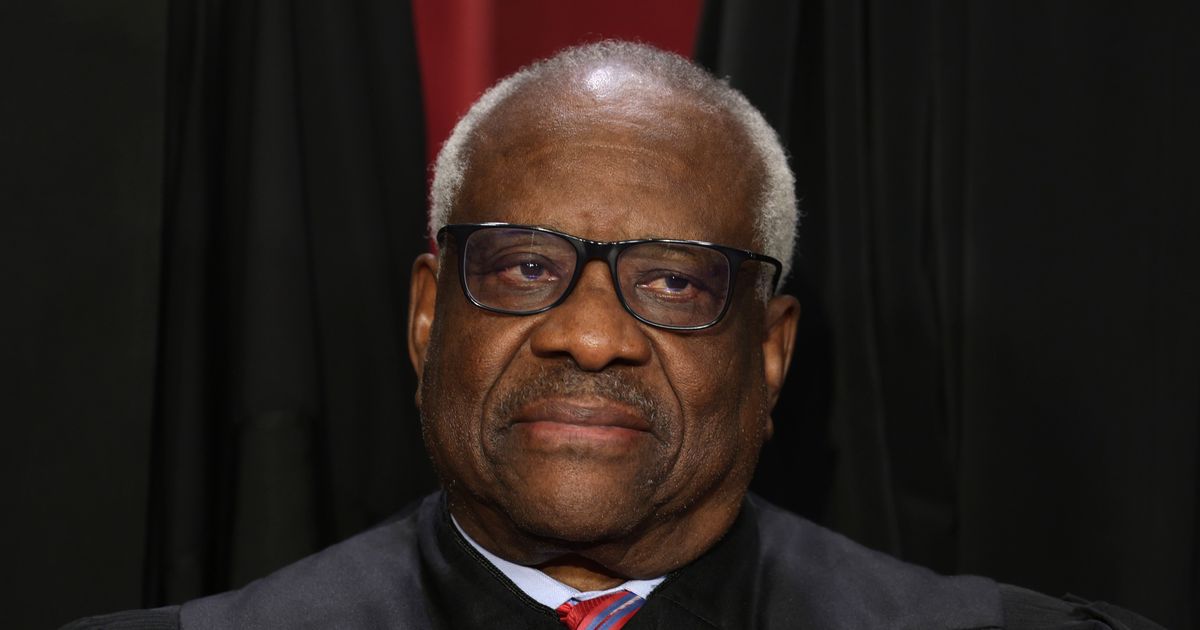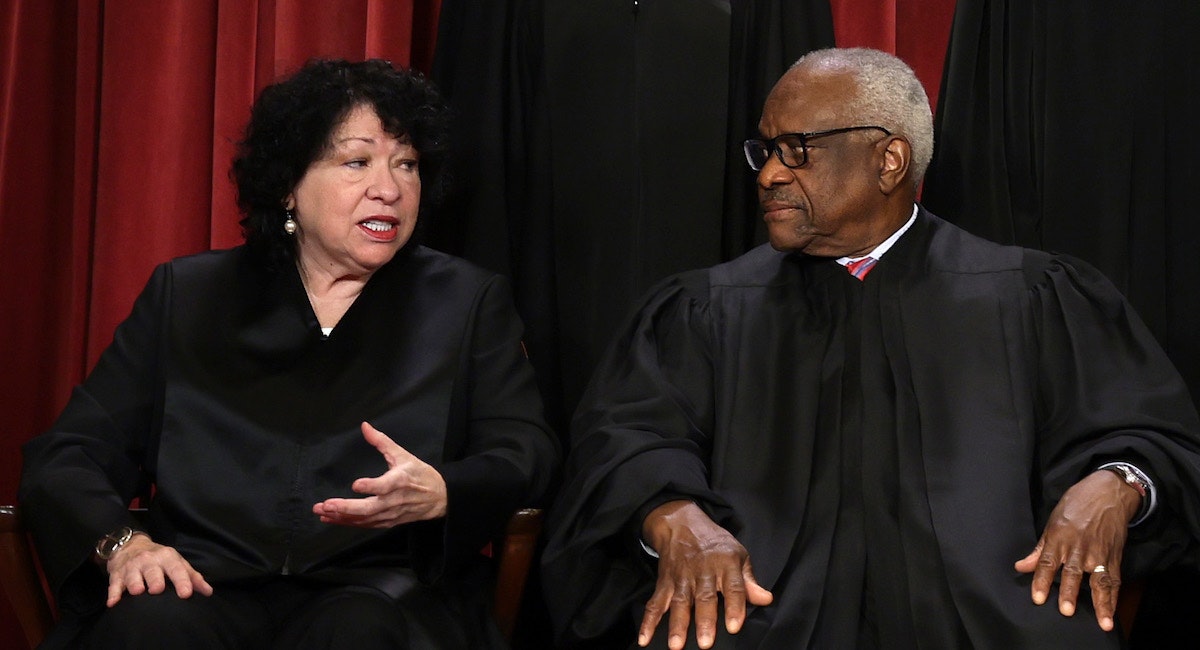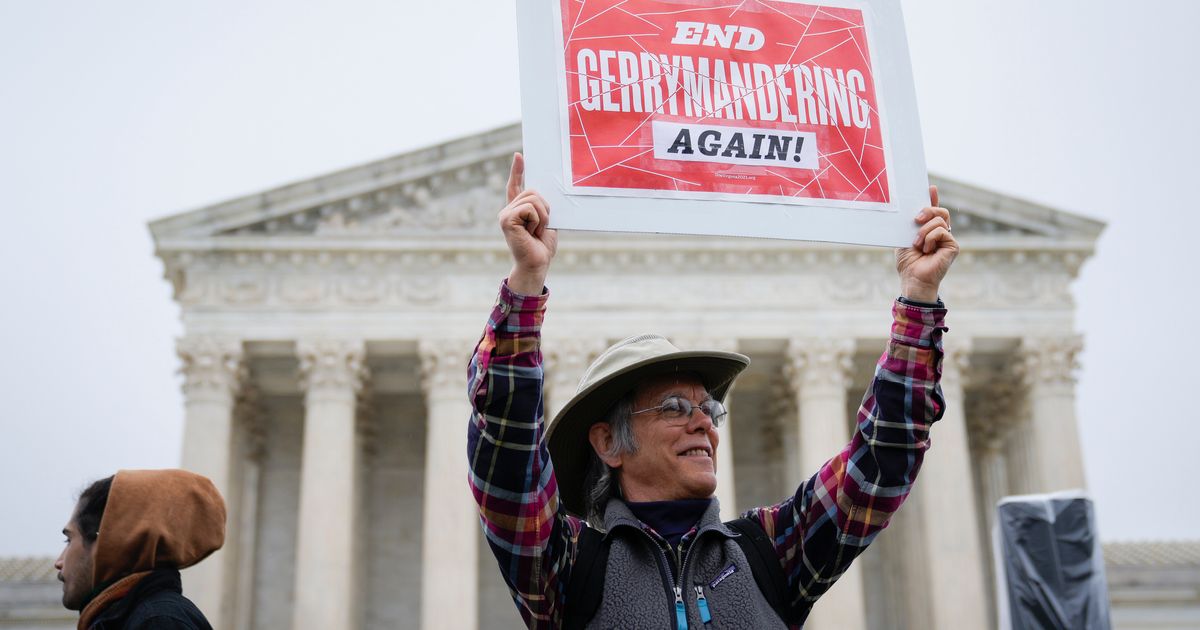Conway’s firm, the Polling Company, sent the Judicial Education Project a $25,000 bill that day. Per Leo’s instructions, it listed the purpose as “Supplement for Constitution Polling and Opinion Consulting,” the documents show. In all, according to the documents, the Polling Company paid Thomas’s firm, Liberty Consulting, $80,000 between June 2011 and June 2012, and it expected to pay $20,000 more before the end of 2012. The documents reviewed by The Post do not indicate the precise nature of any work Thomas did for the Judicial Education Project or the Polling Company. The arrangement reveals that Leo, a longtime Federalist Society leader and friend of the Thomases, has functioned not only as an ideological ally of Clarence Thomas’s but also has worked to provide financial remuneration to his family. And it shows Leo arranging for the money to be drawn from a nonprofit that soon would have an interest before the court.
In response to questions from The Post, Leo issued a statement defending the Thomases. “It is no secret that Ginni Thomas has a long history of working on issues within the conservative movement, and part of that work has involved gauging public attitudes and sentiment. The work she did here did not involve anything connected with either the Court’s business or with other legal issues,” he wrote. “As an advisor to JEP I have long been supportive of its opinion research relating to limited government, and The Polling Company, along with Ginni Thomas’s help, has been an invaluable resource for gauging public attitudes.” Of the effort to keep Thomas’s name off paperwork, Leo said: “Knowing how disrespectful, malicious and gossipy people can be, I have always tried to protect the privacy of Justice Thomas and Ginni.” Leo’s statement did not address questions about whether he had arranged other work for Ginni Thomas or how much money he directed to her in all from the nonprofit. Conway, who was a senior adviser in the Trump White House, did not respond to messages seeking comment.
The Thomases did not respond to messages seeking comment. Ginni Thomas, a political activist and former GOP aide on Capitol Hill, has long maintained that she and her husband keep their careers separate.
In December 2012, the Judicial Education Project submitted an
amicus brief in
Shelby County v. Holder, a case challenging a landmark civil rights law aimed at protecting minority voters. The court struck down a formula in the Voting Rights Act that determined which states had to obtain federal clearance before changing their voting rules and procedures. Clarence Thomas was part of the 5-to-4 majority. Thomas issued a concurring
opinion in the case, arguing that the preclearance requirement itself is unconstitutional. Thomas’s opinion
, which was consistent with a previous opinion he wrote, favored the outcome the Judicial Education Project and several other conservative organizations had advocated in their amicus briefs. He did not cite the Judicial Education Project brief.
Legal ethics experts disagreed about whether the arrangement outlined by Leo and the payments from Conway should have led Thomas to recuse himself from the Shelby case. Federal law requires justices to recuse if their “impartiality might reasonably be questioned,” a standard that has not been well-defined as applied to filers of amicus briefs, the experts said. Law professor Kathleen Clark of Washington University said that if the Judicial Education Project paid Ginni Thomas $100,000 in the year and a half before it filed its brief, the size and timing of the payments would have been enough to cast doubt on Clarence Thomas’s impartiality and require his recusal. Law professor Stephen Gillers of New York University, however, said that as the rule is now interpreted, the link appeared too “attenuated” to require recusal.
Kellyanne Conway, who served as a senior adviser in the Trump administration, at the White House in 2019. (Jabin Botsford/The Washington Post) But both experts said the arrangement shows that current ethics rules and disclosure requirements fail to protect public confidence in the independence of the courts. For example, although justices must report the name of companies that pay their spouses, they are not required to report the names of the companies’ clients. In this case, even if there were such a requirement, it is not clear that the Judicial Education Project would have been listed as a client, because the fees intended for Ginni Thomas were to go through Conway.
“The idea that Leonard Leo, who has a passionate ideological interest in how the court rules and who has worked hard for years to advance that interest, could pick up the phone and generate substantial compensation to Virginia Thomas, which also benefits Clarence Thomas — that idea is bad for the country, the court and the rule of law,” Gillers said. “It’s not the way the Supreme Court should do its business or allow its business to be done.” The effort to keep Ginni Thomas’s name off paperwork makes the arrangement seem “more egregious,” said Clark. In his statement to The Post, Leo said that Ginni Thomas’s work had no bearing on her husband’s opinions.
“I have known Clarence and Ginni Thomas since 1990. They are dear friends and are people of tremendous good will and integrity. Anybody who thinks that Justice Thomas is influenced in his work by what others say or do, including his wife Ginni, is completely ignorant of who this man is and what he stands for. And anybody who thinks Ginni Thomas would seek to influence the Supreme Court’s work is completely ignorant of the respect she has for her husband and the important role that he and his colleagues play in our society.”
Leo, 57, has for years been the behind-the-scenes leader of a
network of interlocking nonprofits that has raised and spent hundreds of millions of dollars to support conservative judges and causes. Marble Freedom Trust, one of the organizations Leo chairs, received a contribution worth $1.6 billion in 2020 from a Chicago businessman, Barre Seid.
The Judicial Education Project was part of that network, although Leo was not listed on its tax filings or incorporation records. Leo’s allies founded the Judicial Education Project in 2004. Its mission was to “conduct research and educate the public on the role of the judiciary as laid out in the U.S. Constitution,” according to its tax filings. It secured tax-exempt status in 2011 and was not initially well-funded, filing paperwork with the IRS indicating it brought in less than $50,000 annually.
In 2012, it received about $1.5 million from donors whose identities were not publicly disclosed, the tax filings show. The Judicial Education Project spent $150,000 on “polling” that year, according to its tax filing. The filing does not identify which firm did the work.
The president of the Judicial Education Project that year was Neil Corkery, a Leo ally and bookkeeper for several of his nonprofit groups. Corkery certified on the group’s 2012 tax filing that no one other than the group’s officers or key employees had control over the nonprofit. Corkery declined to comment. Clarence Thomas has been under scrutiny since
ProPublica revealed in April that Texas billionaire Harlan Crow
took him on lavish vacations and also bought from Thomas and his relatives a Georgia home where Thomas’s mother lived; the
transaction was not listed on the justice’s annual disclosure forms.
Senate Democrats this week held a hearing focused on Supreme Court ethics. Chief Justice John G. Roberts Jr.
declined an invitation to testify, offering instead a statement signed by all the justices in which they reaffirmed their commitment to abide by “foundational ethics principles and practices.” During the hearing, Sen. Sheldon Whitehouse (D-R.I.) mentioned Leo, who The Post has reported used the nonprofit network during the Trump administration to conduct publicity campaigns in support of nominees he helped select. “This guy doesn’t have business before the court,” Whitehouse said. “His business
is the court.” Leo’s ties to the Thomases go back decades and span their personal and professional lives.
Leo advised Clarence Thomas through his contentious confirmation process in the early 1990s and made Thomas the godfather of one of his children. Leo also has hosted the justice at his New England vacation home, according to the
New York Times.
At a Federalist Society
event in 2018, Thomas shared a stage with Leo and jokingly told him, “You’re the Number Three most powerful person in the world.”
The year before that, Ginni Thomas called Leo a “mentor to me” and “a hero” when she honored him with one of her
Impact awards for conservative activists.
“Leonard Leo has single-handedly changed the face of the judiciary,” she said at the awards dinner, held at what was then the
Trump International Hotel in Washington.
“He has many hats. That isn’t even all he does. He does not really tell all that he does. But I know enough to know the man is a force of nature.”
In 2009, when Thomas founded a tea party-aligned nonprofit called Liberty Central, Leo served on the board,
tax filings show. Corkery was the nonprofit’s accountant, public records show. Thomas stepped away from Liberty Central in late 2010 amid controversy over whether its anonymous funding — including one donation for $500,000 — posed a potential conflict of interest for her husband. (
Politico reported the following year that the donation had come from Crow.) She then formed Liberty Consulting, a for-profit firm. On her
LinkedIn page, Thomas describes her work as collaborating with “citizen activists, leaders and nonprofits to succeed and have impact in defending the principles that have made America an exceptional nation.” Liberty Consulting began receiving payments from Conway’s firm within months of its creation in 2011, documents reviewed by The Post show. On multiple occasions, Thomas contacted the Polling Company to discuss her payments, the documents show.
The documents do not indicate whether Thomas knew of Leo’s role in the arrangement with Conway’s company, or of the Judicial Education Project’s role. (Conway sold the company in 2017 to what is now known as CRC Advisors, another firm that Leo chairs.)
Since its first amicus brief, in the voting rights case in 2012, the Judicial Education Project has submitted about a dozen
amicus briefs to the Supreme Court. It has argued for limiting or rolling back race-based college admissions policies, regulations on greenhouse-gas emissions and gun-control measures. In 2014, the group filed a brief in the Hobby Lobby case, which challenged a mandate in the Affordable Care Act that employers make contraception available to workers at no cost to the workers. The court’s ruling struck down part of the requirement in a split decision, with Clarence Thomas again in the narrow majority.
Thomas’s votes were aligned with the Judicial Education Project in six of the cases in which it filed briefs, including the Hobby Lobby case and two involving affirmative action at public universities. Thomas, a longtime critic of affirmative action, voted with the majority to uphold Michigan’s prohibition on race-based admissions at its public universities, and he dissented in a ruling that upheld admissions policies at the University of Texas. Thomas’s votes did not align with the group’s position in three other cases, including one that largely upheld the Environmental Protection Agency’s ability to regulate greenhouse-gas emissions. The court did not take up all the cases in which the Judicial Education Project filed briefs.
The group’s interest in the Supreme Court extended beyond the courtroom. It spent money on campaigns to support President Donald Trump’s nominations of Brett M. Kavanaugh and Neil M. Gorsuch to the Supreme Court. And it is listed as a funder in the credits of a 2020 documentary that celebrated Thomas. Clarence and Ginni Thomas are featured extensively in the documentary, titled “Created Equal: Justice Thomas In His Own Words,” talking about the justice’s upbringing and his judicial philosophy.
As the Judicial Education Project pushed for a conservative court, the group grew into a financial juggernaut and was rebranded as the 85 Fund. Between 2020 and 2021, its revenue nearly doubled from about $66 million to more than $117 million, tax forms show.
Even so, the group has never had more than a handful of employees, tax filings show. It has listed its main office address as a UPS Store situated amid rowhouses and retail stores in the Georgetown neighborhood of D.C.

 www.politico.com
www.politico.com





